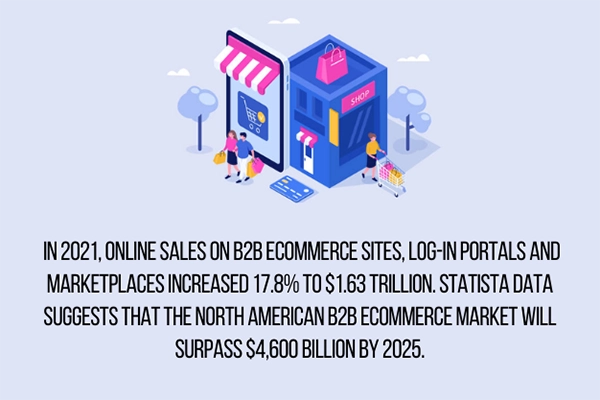Key Benefits of B2B Ecommerce for Manufacturers and Distributors

Today, in the 21st century, the business scene is pretty chaotic and competitive.
Everyone here is trying to one-up each other and digitalization has not made it any easier.
With so much change going on, you need to keep up with the latest innovations, trends, and much more to keep selling.
This is why many businesses have moved on to B2B to streamline their operations.
But as a business owner, manufacturer, and distributor, what benefits does B2B e-commerce have for you?
Have you ever thought of switching to B2B e-commerce platforms so that you can improve your operations as a manufacturer or a distributor?
In this article, we will explore the key benefits of B2B e-commerce for manufacturers and suppliers.
A thorough analysis of this digital trend can show us the digital path can be an unconventional turning point for your business.
Streamlining Supply Chain Operations
How does B2B e-commerce redefine the supply chain for manufacturers and distributors?
Enough data, no data – there’s no dilemma. It’s all about efficiency and accuracy.
A business will be able to cut down on the number of manual procedures being undertaken.
This means that they can minimize repetitiveness and the rise of any errors by simply digitalizing the procurement and stock management processes.
How about having the live stocks with the demand systems processed automatically?
These are much more than just conveniences and that is why they are considered elements of the reliability of the supply chain.
B2B e-commerce systems equip sellers to manage the problems arising in the supply chain.
This way, every move from logistics to delivery is transparent and simple.
DID YOU KNOW?
Businesses with optimized supply chains can have 79% more revenue growth, 50% fewer inventory holdings, 15% lower supply chain costs, and three times faster cash-to-cash cycles.
Enhancing Customer Experience
Let’s discover what the chiefs of our B2B businesses think: Why customer experience is necessary in B2B e-commerce.
Therefore, the B2B buyers of today are just as picky with customer experience and fully expect the same service and personalization as they get in B2C transactions.
Re-improvement of customer experience in the business-to-business sector is a task to offer the simplest and most comprehensible online buying road.
B2B e-commerce platforms with features such as customizable product recommendations, impromptu reordering, and real-time order tracking help industries provide services that meet the utmost needs of their customers.
For this level of service, customer relationships can be fortified in such a manner that customers return to do business with you because of the quality service that you provide.
This eventually paves the way for both dominance in the market and business success.
Cost Reduction and Revenue Growth
How does B2B e-commerce give cost reduction and revenue growth in parallel?
Rather than focusing simply on cutting costs at the factory by optimizing operations and expanding market reach, ecommerce is given the greater power of saving on fixed costs while tapping into the new sales stream.
A B2B ecommerce strategy lets you do away with the need for physical stores and allows for the reduction of operation costs, which were initially high.
Besides, the capability to reach new markets and consumer groups that are globally available through ecommerce platforms is used without any geographical constraints of traditional sales along the same lines.
Both efficiency and expansion of their customer base would result from these cost savings and market potential.
Digital commerce tools become a great opportunity engine for serious businessmen who are willing to invest in their digital commerce capabilities.
Integrating Systems and Data Analysis
Why is system integration and data analysis pivotal in B2B e-commerce success?
Integrating key business systems like ERP (Enterprise Resource Planning) and CRM (Customer Relationship Management) with your e-commerce platform can lead to unparalleled operational efficiency and insights.
This integration ensures seamless data flow across your business, enabling automated and informed decision-making.
Moreover, leveraging data analytics helps in understanding market trends, customer behavior, and sales performance, driving strategic decisions that can significantly enhance business outcomes.
With the right integration and analytics in place, B2B e-commerce can transform from a transactional platform into a comprehensive business management tool that propels your company forward.
Access to Professional Consultation
What sorts of business considerations are inducing companies to enlist the services of professional B2B e-commerce consultation?
The B2B e-commerce business is filled with perplexities. Even when one is trying to harvest the biggest fruit from the same tree, it is tedious.
Professional consultants provide personalized expert guidance based on the specific goals of your business and market conditions.
These strategies help to reinforce the message and achieve your marketing objectives.
They are experts in this field, having done in-depth work on the operations of an e-commerce business, which cover such aspects as system integration and distribution tactics.
Through using b2b ecommerce consulting services, enterprises will be able to overcome bottlenecks, speed up their own digital transformation experience, and thus have an advantage in their market.
Such a partnership in place, in addition to providing instant means of accessibility, lays the foundation for the future success of digital marketing strategies.

Bottom Line
What is the future for B2B e-commerce platforms adopted by manufacturers and wholesalers?
With streamlined operations, excellent customer service, cost minimization, etc, it is possible that the road map to digitalization actually exists.
Technology in B2B is not a mere trend, it is all about adopting new ways of running your business and interacting with its customers.
By linking digital commerce with basic strategies, manufacturers and distributors can easily satisfy the demands of the market as well as keep up with future trends.
Digital transformation in the B2B environment is not just a move, but it is a jump forward to business greatness and a market position leader.










